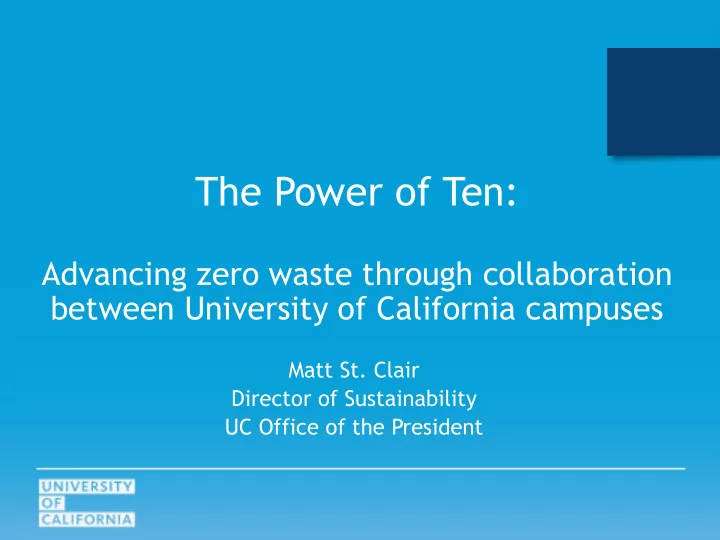

The Power of Ten: Advancing zero waste through collaboration between University of California campuses Matt St. Clair Director of Sustainability UC Office of the President
Road Map • History of UC Collaboration + Zero Waste Goal • UC Waste Diversion Data • Best Practice Sharing Examples • Collaboration Examples: • Negotiated Sustainability Incentive from Lab Vendors • Green Event Certification Training Grant • Zero Waste 2020 Communications Plan • Systemwide Zero Waste Plan • Potential Centers of Excellence • Challenges & Opportunities
History of UC Collaboration • Recycling Managers self-organized meetings • Formal working group charged with policy development • Waste Management & Recycling policy section adopted in 2007 • Goals for 50% diversion by 2008, 75% by 2012; Zero Waste by 2020
Working Group Process • Working group developed policy language and oversees implementation and reporting • Monthly conference calls • Shared drive for minutes, data, and other documents • Introduced a user-friendly data reporting and survey tool with built-in comparison dashboards • Subcommittees on labs, procurement, and communications
FY 15-16 Data Update 2015-2016 Diversion Rate (without C&D) Zero Waste (95% Diversion) 100% 90% 80% 78% 74% 80% 72% 69% 66% 63% 70% 62% 56% 60% 47% 45% 50% 34% 40% 31% 28% 27% 30% 20% 8% 10% 0%
Zero Waste Progress Recent Diversion Rates (MSW & C&D) Zero Waste (95% Diversion) 100% 90% 86% 81% 80% 80% 76% 74% 73% 67% 70% 64% 62% 60% 48% 50% 40% 30% 20% 10% 0% UC Berkeley UC Davis UC Irvine UC Los UC Merced UC UC Santa UC Santa UC San UC San Angeles Riverside Barbara Cruz Diego Francisco FY 2012/13 FY 2013/14 FY 2014/15 FY 2015/16
Zero Waste Progress Recent Diversion Rates (MSW Only) Zero Waste (95% Diversion) 100% 90% 80% 78% 80% 74% 72% 69% 70% 63% 62% 60% 56% 47% 50% 45% 40% 30% 20% 10% 0% UC Berkeley UC Davis UC Irvine UC Los UC Merced UC UC Santa UC Santa UC San UC San Angeles Riverside Barbara Cruz Diego Francisco FY 2012/13 FY 2013/14 FY 2014/15 FY 2015/16
Zero Waste Progress Medical Centers - Recent Diversion Rates (MSW Only) Zero Waste (95% Diversion) 100% 90% 80% 70% 64% 60% 50% 40% 34% 31% 27% 30% 20% 8% 10% 0% UC Davis Med. UC Irvine Med. UC Los Angeles Med. UC San Diego Med. UC San Francisco Med. FY 2012/13 FY 2013/14 FY 2014/15 FY 2015/16
Best Practice Awards Program • 2007: UC Davis: Composting Initiative • 2008: UCSF: Compost Program for Animal Bedding • 2010: UC San Diego: Toby’s Spot Re -Use Program • 2011: UC Davis: Aggie Stadium 2010 Football Season • 2012: UC San Francisco: Instructional Recycling Video • 2013: UC Merced: Reusable To-Go Container Program • 2014: UC Santa Cruz: Loadman Real-Time Waste Metrics for Weight Based Recharge and Diversion • 2015: UC Santa Barbara: Custodial Staff Engagement • 2016: UC San Francisco: Consolidate & Sort Program
Collaboration Examples
Procurement Contract Incentives • “Sustainability Incentive” • Negotiated into system-wide procurement contracts • Lab suppliers creating non-reusable, non-recyclable waste • Contracts to date: • Bio-Rad, Miltenyi Biotec, Stirling Global Cooling, Eppendorf, NEB • $40,000 received to-date • Grants Committee formed to award funding for projects with system-wide benefit
Green Event Certification Training • WHAT • WorldCentric awarded UC a $10k grant • To promote zero waste and specifically the development of an infrastructure and demand for composting • WHY • Purpose: to accelerate and scale up Green Event Certification programs on UC campuses • HOW • $1k mini-grants for each UC campus to organize a model green event to train event managers from across campus
Zero Waste 2020 Communications Campaign This year we welcomed the Class of 2020 to the UC “Zero Waste Class” Goal – Introduce a systemwide Zero Waste communications campaign that fosters collaboration and unifies our efforts in reaching the Zero Waste 2020 goal collectively Strategy – Utilize our campus communities as a catalyst for our messaging with assistance from marketing experts, UCOP Communications, M+R, and the expertise of the Working Group
System-Wide Zero Waste Plan Building on campus- level plans… What can be done at the system level to support zero waste? Preliminary Planning Objectives: Connect to UC mission and business priorities ▪ Identify and engage leadership champions ▪ ▪ Identify and develop (new) tactics and tools
4 PILLARS OF ACTIVITY: Pillars Process – Preliminary Activity DETERMINE HOW CHANGE MIGHT BE INFLUENCED AT THE SYSTEM WIDE LEVEL
Challenges • Waste disposal options vary by geographic location • Changing landscape of recycling markets • ‘Easy’ to divert material has been achieved • Lab, research, and medical waste is complicated • Competing interests for funds and support within sustainability efforts • Reporting reduce & reuse categories effectively • Policy on Waste to Energy (WTE)
Opportunities • Leverage Procurement (both to reduce waste and to close the loop and buy recycled) • Encourage resource allocation to reduction and reuse • Determine program inefficiencies/redundancies • Engaging the campus community, students! • Identifying policy updates that support Zero Waste • Learning from each other and not reinventing the wheel • Partnering with outside organizations
Network to Network • The UC network has facilitated participation in and best practice sharing with state and national networks: • CURC • Recyclemania • Green Sports Alliance • AASHE (STARS) • U.S. Zero Waste Business Council • California Resource Recovery Association
Questions & Feedback Matt St.Clair: Matthew.StClair@ucop.edu Hilary Bekmann: Hilary.Bekmann@ucop.edu
Recommend
More recommend